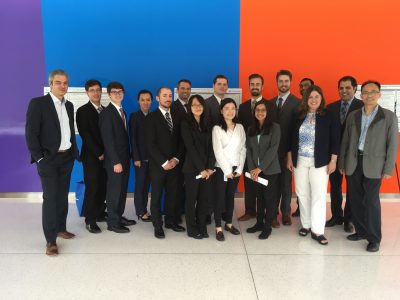This week’s spotlight is on Professor Fei Miao, who is an assistant professor in the department of Computer Science and Engineering. Fei received a Bachelors of Science in Automation with a minor in finance from Shanghai Jiao Tong University. She then went on to receive a Ph.D. degree, a dual-Masters degree in Statistics, as well as the “Charles Hallac and Sarah Keil Wolf Award for Best Doctoral Dissertation” in Electrical and Systems Engineering from the University of Pennsylvania. Before joining UConn in 2017, she was a postdoc researcher at the GRASP lab and the PRECISE lab at the University of Pennsylvania. Some of her current key active research projects focus on (1) data-driven optimization and control and their application to transportation resource allocation, (2) cyber-physical systems security, (3) safety of autonomous transportation systems, and (4) coordination of autonomous vehicles. In terms of future directions for her research, she hopes to work on (1) the planning, reasoning and learning of autonomous systems, (2) safety assurance of autonomous vehicles, (3) resilient and secure autonomous systems, and (4) heterogenous transportation networks.
The broad agenda of her work is to develop the foundations for the science of data-driven cyber physical systems and autonomous transportation systems. More specifically, she focuses on the safety, efficiency, and security of these systems. Her background spans several technical fields that are all relevant to cyber-physical systems and autonomous transportation systems. This includes optimization, control theory, machine learning, game theory, and formal methods.
Thus far, her research has focused on data-driven dynamic robust resource allocation for system-level efficiency with learning, control, and optimization approaches. She has also worked on the optimal control and attack detection approaches for cyber-physical systems. In addition to system modeling, theoretical analysis, and algorithmic design, her work has also involved experimental validation in urban transportation data, simulators and small scale autonomous vehicles.
She recently finished two publications, new in 2018. The first is titled “A hybrid stochastic game for secure control of cyber-physical systems”, which was published in the journal Automatica. This paper establishes a zero-sum, hybrid state stochastic game model, which can be used to design defense policies for cyber-physical systems against different types of attacks. This model that was proposed in this paper consists of (1) physical states that are described by a set of system dynamics, and (2) a cyber state that represents the detection mode of the entire system, which is composed of a set of subsystems. Finally, the team applies a moving-horizon approach which provides scalable and real-time computations of switching strategies.
Her second publication is titled “Data-Driven Robust Taxi Dispatch Under Demand Uncertainties”, which was published in IEEE Transactions on Control Systems Technology. The paper sets out to address the problem on how to deal with uncertainties in terms of predicted customer demand, while also simultaneously fulfilling the system’s performance requirements. The solution was a data-driven robust taxi dispatch system that takes into account the spatial-temporally correlated demand uncertainties.
Dr. Miao is also current a Co-PI for two different projects. The first is titled “Modeling, Analysis, and Anomaly Detection for Cyber Secure Power Distribution Networks”, which is funded by Eversource Energy. The second is titled “Energy Management Systems for Subtractive and Additive Precision Manufacturing”, funded by CESMII.
